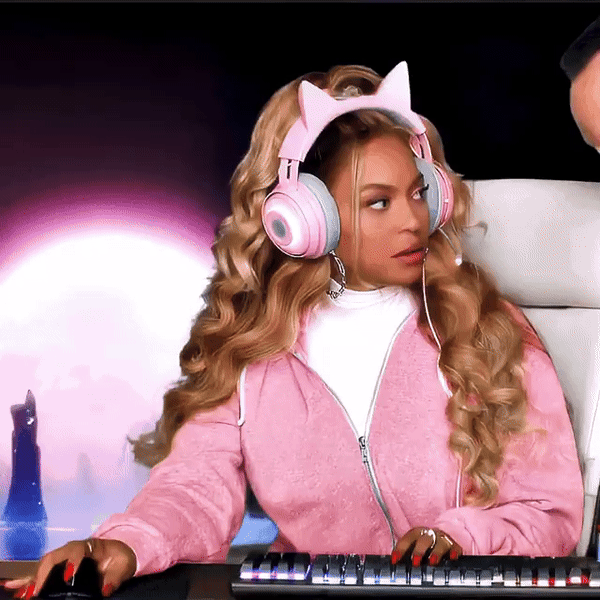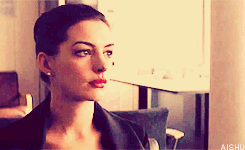Au$tin
Diamond Member
Pop Culture Guru
Grrrrrrrrrr. Fuckity fuck why don't you watch my film before you judge it? FURY.
Joined: August 2008
Posts: 54,625  My Charts
Pronouns: He/his/him
My Charts
Pronouns: He/his/him
|
Post by Au$tin on Apr 9, 2019 8:31:24 GMT -5
#1 with 307k SPS (165k sales) per HITS. 313k SPS (170k sales) per Billboard. Also the youngest woman to debut at #1 since Demi in 2009 (she was 16). Who’s the youngest woman to have her *first* album *debut* at #1? I’m thinking Britney; she was barely 17 when BOMT dropped. Correct me if I’m wrong (LeAnn and Demi’s sophomore albums debuted at #1). Miley. No matter how you slice it, she seems to have that in the bag. Hannah Montana 1 - If you want to classify HM as Miley's debut, then this debuted af #1. Though it has plenty of songs from other artists. Miley was 13. Hannah Montana 2 - If you want to discredit the first soundtrack for having songs from other artists, this also debuted at #1. The first CD was all Miley's vocals as Hannah. Or you could classify it as Miley's debut if you want to discredit Hannah alltogether since the second CD is effectively Miley's debut. Miley was 14. Breakout - If you want to discredit anything involving Hannah, making this Miley's debut album, this also debuted at #1. Miley was 15. |
|
Gary
Diamond Member
Joined: January 2014
Posts: 45,896
|
Post by Gary on May 9, 2019 9:48:13 GMT -5
Why All Eyes Are on Billie Eilish, the New Model for Streaming Era Success
News
By Lyndsey Havens | May 09, 2019 9:55 AM EDT
Katy Perry brought snacks -- a clear plastic bag of chips and Pedialyte, to be precise. It’s the second day of Coachella’s first weekend, and Perry is huddled among a rarefied group of festivalgoers at the Outdoor Theatre. There’s Perry’s fiancé, actor Orlando Bloom; Late Late Show host James Corden; omnipresent DJ-producer Diplo; Apple CEO Tim Cook; and Apple Music global creative director/Beats 1 host Zane Lowe, plus much of Interscope Records’ staff. The only person missing is the star they’ve all come to see: Billie Eilish.
Two weeks earlier, Eilish -- the 17-year-old singer-songwriter who has been pronounced everything from a prodigy to the future of pop -- dropped her debut album, When We All Fall Asleep, Where Do We Go? It immediately shot to No. 1 on the Billboard 200, making Eilish the first artist born in the 21st century to hit the chart’s peak; it returned to No. 1 a month later. Today is her first live performance since its release.
Eilish was scheduled to hit the stage nearly 30 minutes ago, but her crew is still making last-minute adjustments to her LED-paneled floor. Perry eagerly chants, “Fuck the screen!” while Eilish’s team whispers somewhat anxiously about the holdup. But outside of the viewing area reserved for Eilish’s friends and family, the growing crowd appears unfazed. An artist can only make her Coachella debut once, a notion deeply understood by the tens of thousands who want to one day say, “I was there” -- and by Eilish herself.
In the short time since When We All Fall Asleep arrived, Eilish’s fame has reached the stratosphere of superstardom. Tegan & Sara, Paramore’s Hayley Williams, Niall Horan and Demi Lovato all have publicly praised the album on Twitter and Instagram. Privately, Eilish has been getting a constant stream of DMs and texts from fans ranging from rappers she prefers not to name to Avril Lavigne. The singer messaged Eilish to say congratulations, suggest the two hang out in Los Angeles and remind her that she, too, got her start in the industry at a young age and was always there to talk. “That made me break down,” says Eilish.
When I ask her the day before her festival set how she has been processing all of this, she tells me she started talking about herself in the third person. “I don’t know how to look at this, thinking it’s me,” she says. “Everything that’s being said about me and what I’ve created -- I’m playing Coachella tomorrow and I’m doing this and I’m doing that -- I keep having to think of it like I’m not me, because it is just a name. It’s like a brand, which I own and I have the rights to, but it’s also something else. It’s a very strange feeling.”
None of this happened overnight. The artist born Billie Eilish Pirate Baird O’Connell broke out in November 2015 when her dreamy ballad “Ocean Eyes,” written by her older brother, Finneas O’Connell, now 21, blew up on SoundCloud. Eilish was 13. That same month, she secured manager Danny Rukasin, who knew O’Connell, saw Eilish’s potential and reached out; Brandon Goodman also later signed on as co-manager. A handful of When We All Fall Asleep tracks recall those early, airy vocals and O’Connell’s cavernous production, but others, like singles “Bury a Friend” and “You Should See Me in a Crown,” employ a starkly different, tightly explosive style, often abandoning any standard song structure. Says O’Connell, “I always try to achieve uniqueness by not shying away from strangeness.”
Though Eilish grew up in the golden age of streaming -- she hit the 1 billion mark before even dropping a full-length project, and has now garnered 3.79 billion on-demand U.S. streams (through the week ending April 25), according to Nielsen Music -- she values “whole pieces of art.” Childish Gambino’s Because the Internet is one of her favorite albums, and she always had intended to create one of her own, a vision shared by her team. And while the meteoric success of When We All Fall Asleep blindsided many, it is actually the result of years of meticulous artist development and a well-calculated major-label effort to build a career that will last. By releasing so many singles leading up to its release -- none of which sound too similar and all of which showcase Eilish’s chameleonic abilities -- she was able to land on multiple genre-based playlists and “be everywhere at once,” says Rukasin.
“There was a moment where artists and songs were living and dying by what playlist they could be on,” he explains. “We made sure to be the standout on different ones.” As Justin Lubliner -- who signed Eilish to his Interscope imprint and management company The Darkroom in August 2016 -- says, “We made the blueprint for how to be an albums artist in a streaming era.”
Still, Eilish almost didn’t release hers. The day before her album dropped, she was at a Jimmy Kimmel Live! taping, having second thoughts. “I’ve never felt that way,” she recalls, “where it’s my child and I don’t want anybody’s hands on it.” She asked her team, “Can we not put this out?” and remembers thinking, “I don’t want to do it anymore.” For three years, it had been just her and O’Connell, making music together in his bedroom studio. “[It’s rare] to actually really fuck with what you make and create,” says Eilish. “I didn’t want the world to be able to tell me how they feel about this thing I love.” She looks up to lock eyes with me. “But the response has been crazy.”
Judging by the deafening screams when she finally takes the Coachella stage, “crazy” doesn’t begin to describe it. Opening the set with her latest single, the bouncy yet brooding “Bad Guy,” Eilish exudes the confidence of a seasoned headliner. Only a handful of teen pop stars before her have reached this kind of high so early in their careers -- and, as both she and O’Connell know, many later cracked under the weight of fame.
“There’s so much pressure and so much expectation, and it’s so public,” he says. “It’s amazing that anyone has navigated it, especially someone as young as Billie.” Eilish herself is more modest. “I’m in the good old days right now,” she says. “Who knows if this is my peak and then I die or some shit? Or my career dies and I go away and no one cares.” She pauses, considering another option: “Or it gets crazier.”
Eilish emerges from her hotel room at the Hyatt Regency Indian Wells Resort & Spa on an electric scooter, which she rides in circles around the table where we’re about to sit down to talk. It’s the day before her Coachella slot, and she looks expensively tomboy-chic in an oversize blue Louis Vuitton long-sleeve button-down and matching pants. She wears a ring on every finger and several chains cascade down her neck, including a diamond pendant of a skewed men’s bathroom logo that represents her merch line, Blōhsh.
“I feel like somehow everyone knows what’s happening with me,” says Eilish with a sigh. She often sighs between thoughts -- likely a blend of exhaustion and shock that, yes, everyone does want to know what’s happening with her now -- and ends most sentences by saying, “It’s weird” (a word she repeats 26 times during our chat). And it is weird. Eilish is a teenager with the kind of overwhelming early success that puts everything within reach. Growing up in a two-bedroom home in Los Angeles’ Highland Park neighborhood with her brother, mom and dad, she couldn’t afford to attend Coachella, and now she’s performing there; she has yet to secure her driver’s license but already has a brand-new matte black Dodge Challenger; and while she used to ride a Razor scooter up and down her short block, she now rides a “cosmic blue” Unagi around hotel rooms, label parties, festival grounds and backstage artist lounges. Wouldn’t you?
Long before all this, Eilish had just entered her teens and was already fielding a frenzy of requests from an industry eager to capitalize on the success of “Ocean Eyes” and her singular cool-girl appeal. At 14, she had hired a publicist and agent in Alexandra Baker, who helped Eilish establish her image by, among other things, introducing her to Chanel, which booked her to perform at an event in November 2017. As the demand for Eilish grew, O’Connell -- who maintains a solo career as independent singer-songwriter FINNEAS -- remained her sole co-writer and producer. One year after “Ocean Eyes” hit SoundCloud, the song got its proper release as a single off her Don’t Smile at Me EP, which hit No. 14 on the Billboard 200 this January. Before it even dropped, she and O’Connell started working on When We All Fall Asleep, first writing the hushed “Listen Before I Go” in May 2016. They finished it in January.
Goodman says When We All Fall Asleep proves the album isn’t dead: “With Billie, everything feels like it belongs together,” from the touring visuals to the fact that, inspired by Because the Internet, Eilish made sure some songs referenced one another. He continues, “Everything feels like this is a moment.” That’s because it is. After the album’s release, 12 of its 14 tracks reached the Hot 100, along with Eilish’s Khalid collaboration “Lovely” and “Ocean Eyes,” breaking the record among women for the most simultaneously charted Hot 100 hits.
Eilish’s 16-member team spent nearly eight months developing a rollout strategy, always planning to coordinate the release date with a nighttime Coachella set. Every step of the way, it was clear she was promoting an album. Lubliner avoided choosing a focus track, instead allowing each genre-jumping song to become a new entry point for fans. He remembered watching how Travis Scott and Chance the Rapper broke into streaming: not through one song, but with a body of work and a well-defined image.
“There’s a little bit of that hip-hop zeitgeist in this project,” says Rukasin. Scott and Chance may be only 28 and 26, respectively, but for Eilish, they are old enough to set an example. “That was always the type of artist I wanted to work with, and Billie was the type of artist that wanted to be developed that way,” explains Lubliner.
Before building her core team, Eilish had worked briefly with London-based A&R and creative services company Platoon (a partnership that O’Connell had forged), which Apple acquired in 2018. Though she was Apple’s Up Next artist in September 2017; has a Beats 1 show, Groupies Have Feelings Too; and wrote a song with O’Connell for Apple’s 2018 holiday commercial, her team hasn’t shown favoritism toward Apple or any one platform, frustrating some streaming executives who had hoped to take more credit for her success along the way, sources tell Billboard. In February, she partnered with YouTube for the launch of its original mini-film series initiative, and at Coachella, the platform gave her a plaque, a Louis Vuitton-themed cake and a letter from its CEO for hitting 10 million subscribers. In March, Spotify crafted an interactive experience in downtown L.A. in which 14 rooms represented her 14 album tracks. Internationally, she has worked with Amazon Music and Deezer.
“She really worked her ass off and said yes to as many opportunities as she could,” says Lubliner. From the start, Eilish toured relentlessly (accompanied by O’Connell and their parents) to perform and do press, building out a core fan base in every market. Lately, says Eilish, she only has downtime when going to the bathroom, where she’ll watch The Office on her phone to de-stress.
Now, according to her team, the demand for Eilish has become so undeniable that other labels have started a case study to examine her strategy. “If I saw that someone did a good job developing an artist, of course I would want to know what was different,” says Interscope Geffen A&M chairman/CEO John Janick. “The good thing about this is that Billie is so special, it’s hard to replicate that. You can do as many case studies as you want, but there’s only one Billie Eilish.”
Days before Eilish’s Coachella set, she listened to Britney Spears’ discography. “I thought: ‘Oh, this poor girl, this poor girl,’ ” she says now. “Not that I pity anyone -- that’s condescending. I just feel for them.” Around the same time, Eilish and Ariana Grande started texting. “We had this weird feeling for one another,” says Eilish. “Our careers are completely different and we’re in different places, but we understand [one another]. I think it’s just that way with artists right now, especially with women in the music industry. We’re all feeling it.” Goodman says Eilish constantly hears that she’s “living the life,” but because she has followed the careers of so many artists before her simply from a fan perspective, she’s familiar with the roller coaster of fame -- and unafraid to confront it.
“[My music] is about comfort, and it’s about ‘I know how you are feeling, and you are not alone,’ ” says Eilish. With the press of a button, she can connect with her 21.3 million Instagram followers. But a quick scan of her account -- where Eilish’s unfiltered photos reflect the current “I am who I am” approach preferred over perfectly posed shots -- offers no evidence that she just played Coachella, the social media content magnet of festivals.
“I experienced things at Coachella that are going to stick with me for my whole life,” explains Eilish two weeks later. “And I want those memories to be my memories, not the whole internet’s. I got what I got through SoundCloud and through Instagram, and I can’t be mad at that -- even though sometimes I am. Not at the fact, but at social media as a whole.” She admits she has met “some of the best people” thanks to the internet, including her close friend Crooks, the London rapper she met through Instagram who lent his voice to “Bury a Friend” (there are no credited features on the album) and appeared in its video.
These days, Eilish is regularly shaking hands with high-profile people, though she says, “Meeting somebody through real life is so weird.” She has become good friends with Tierra Whack (who waited backstage after Eilish’s set) and Jessie Reyez, met Lana Del Rey (to whom her haunting voice has been compared) and Sam Smith, snapped a Polaroid with Grande at Coachella and, the day after her own set, met her idol Justin Bieber -- an encounter his manager Scooter Braun captured on video. (It went viral with over 2 million views.)
“I’m at this place where I kind of know all of the people that I’m a fan of,” she whispers. “It’s very weird.” Recently, when she met Timbaland in the studio -- he had posted a video on social media of his blown-away reaction to “Bury a Friend” -- Eilish told him she was into the beats he played her. “I don’t even know what’s good anymore,” the stunned producer replied. Such might be the post-Eilish effect: She has dropped the kind of game-changing album that forces emerging and established artists to match the bar she has raised.
Of these many recent run-ins, it was her conversation with Mel C, aka Sporty Spice, that changed the way Eilish thinks about her career. “When you’re young and this is happening, all you’re trying to do is get through it and survive,” Mel C told her. “And then when it’s over, you’re like, ‘What just happened?’ ” Eilish says she hasn’t stopped thinking about that. “I am just trying to survive it,” she says. “For so long, I’ve been complaining about so many things because there is a lot to complain about, but I need to take it in and really see how amazing and rare this is.”
Living in the moment is partially a necessity. Thinking about the future, she says, “will make me throw up, honestly. I’m here today, and tomorrow, I will be doing what I do tomorrow. The things that I have to do in my life are really big deals, and they all are on me. That’s a lot to think about.”
Even so, Eilish often has said she used to cry because she wanted all this so badly. And now that she has it? She slumps in her chair and, after a long pause, arrives at a realization: “I don’t want it to ruin my whole life.” It’s an enlightened level of awareness at her age -- and proof, perhaps, that she’s equipped to survive the gauntlet of pop stardom.
“People love to talk about us being self-made, and we are, because we make our records in seclusion, just the two of us in a bedroom,” says O’Connell. “But it’s taken a village of people to support us in our vision” -- a vision that Eilish is still unveiling to the world. “I don’t want anybody to know [my goals], because then they’ll try and help me,” she says. “I want to do this shit myself.” Spoken like a true teenager.
Going Global
In an industry dominated by experimental release strategies and last-minute, digital-first albums, Billie Eilish has shown the power of sticking to a carefully plotted global marketing plan -- vindicating believers in old-school artist development and major-label scale. “Our approach was always to treat her as a global artist, using all the platforms as partners to give her as many inroads for fans” as possible, says Interscope Geffen A&M (IGA) vice chairman Steve Berman. Here’s how she and her team accomplished that.
Core Focus
When Spotify first featured “Ocean Eyes” on its New Music Friday playlist, the song didn’t resonate like hip-hop did at the time. But the metrics, says Spotify head of global genre groups Mike Biggane, called to mind Post Malone, whose core fans drove his engagement on the platform before his mainstream breakthrough with “rockstar.” When “Lovely” with Khalid dropped, Eilish’s whole catalog exploded. “This is what true reactivity looks like in an attention economy,” says Biggane. “She’s always focused on her core fan base. Credit’s due to her team for maximizing opportunity as her audience developed.”
Local Intel
Lubliner has connected with key players in individual markets to ask: “If you sign a local artist, what are the five things you would do outside of streaming?” The result: advice on everything from what publications to pitch to which college radio stations to approach to which performance sessions to book around the globe. “Then,” he says, “we would spend a lot of time when she would go to each market doing all those things” -- but always with Eilish’s input. “She has been true to herself since day one,” says Lindsey Fell, YouTube artist relations manager.
Major Vision
Allowing Eilish and her brother, Finneas O’Connell, to take their time creating an album in his bedroom was, says IGA chairman/CEO John Janick, “supporting what they wanted to do because they had a vision. We were acting like an indie in that sense,” while using major-label clout to find global partners. “Billie is fully [involved] across all of her creative, down to the smallest details,” says Apple Music’s Zane Lowe. “She is riding a wave of her own making.”
|
|



 Heavy on the unless.
Heavy on the unless.








